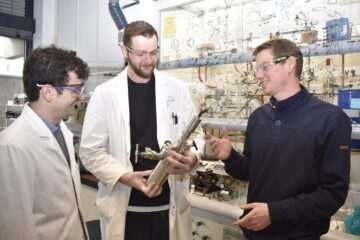Peninsula Medical School research team's breakthrough in fight to combat diabetes

Academics at the Peninsula Medical School are looking at what role genes play in people who develop Type 2 diabetes and how they can be used to predict the onset of the disease.
More accurate prediction could lead to improved ways of preventing the disease or at least reducing its effects.
Type 2 diabetes develops when the body can still make some insulin, but not enough, or when the insulin produced does not work properly.
It is often linked to overweight people and usually appears in those over 40.
But in recent years, increasing numbers of children have been diagnosed with the condition, some as young as seven.
Research into the genes has been led by Dr Timothy Frayling, senior lecturer at the Peninsula Medical School.
His team have been looking for variants within the human genome that relate to the risk of Type 2 diabetes by examining thousands of DNA samples from across the UK.
Dr Frayling likens the process to identifying the types of DNA that result in the three main eye-colour types.
He said. “By comparing the genes together we have been able to take the first step towards providing predictive value through genetics for the prevention and control of Type 2 diabetes.
“The disease can be prevented through specialist dietary and exercise advice and intervention, but strict intervention is an expensive process and not everyone who is at risk can benefit from it.
“We hope that the outcome of our research will result in better mainstream prediction for Type 2 diabetes, which will in turn reduce the number of people suffering from the disease, and reduce the cost of treatment and intervention to the NHS.
“For example, we now know there are approximately four per cent of the population who are at much higher risk than other groups of people and it may be most cost-effective for the NHS to target preventative measures at them.”
Type 2 diabetes is treated with lifestyle changes such as a healthier diet, weight loss and increased physical activity.
Tablets and insulin may also be required to achieve normal blood glucose levels.
Dr Frayling warned that there was still some way to go before the information could be used in clinics. But he said the latest research represented a significant step forward.
Media Contact
More Information:
http://www.pms.ac.ukAll latest news from the category: Health and Medicine
This subject area encompasses research and studies in the field of human medicine.
Among the wide-ranging list of topics covered here are anesthesiology, anatomy, surgery, human genetics, hygiene and environmental medicine, internal medicine, neurology, pharmacology, physiology, urology and dental medicine.
Newest articles

Lower dose of mpox vaccine is safe
… and generates six-week antibody response equivalent to standard regimen. Study highlights need for defined markers of mpox immunity to inform public health use. A dose-sparing intradermal mpox vaccination regimen…

Efficient, sustainable and cost-effective hybrid energy storage system for modern power grids
EU project HyFlow: Over three years of research, the consortium of the EU project HyFlow has successfully developed a highly efficient, sustainable, and cost-effective hybrid energy storage system (HESS) that…

Safer alternative for an explosive reaction
The chemical industry has been using a reaction with explosive chemicals for over 100 years – now Mülheim scientists have discovered a safer alternative. The Ritter Group of the Max…





















